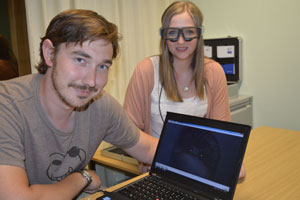11 August 2014
You've got the look
Colchester Campus

Dr Tom Foulsham with student Louise Clarke with eye-tracking glasses
Research on eye-tracking devices involving the Essex sheds new light on the implications of wearable technology like Google Glass.
The study found that wearers of smart glasses such as Google Glass can easily forget they are recording what they see and, despite the best of intentions, could violate other people’s privacy.
The research, a collaboration between Eleni Nasioupolous and colleagues at the University of British Columbia and Dr Tom Foulsham from Essex, got participants to wear an eye-tracking device that records eye movements and – just as Google Glass and other smart glasses do – the wearer’s field of view.
During the study, which is published in the British Journal of Psychology, it took only ten minutes for study participants wearing eye-trackers to essentially forget they were being monitored. However, when their attention was drawn back to the eye-tracker their behaviour changed to more socially-acceptable behaviour.
This is contrary to previous studies which have shown that people who wear an eye-tracker change their natural looking behaviour in a prosocial manner and is good news for researchers who use eye-trackers to measure attention and behaviour. However, it could be bad news for advocates of wearable computing in everyday life.
Explaining the findings, Dr Foulsham said: "People act differently when they are being watched. However, our results show that people quickly forget when wearing monitoring technology like Google Glass and act more naturally. Unfortunately, this might mean that people stop self-monitoring and end up recording things they wouldn't want seen, which is a problem for privacy."
Data privacy watchdog the UK Information Commissioner’s Office is one of the latest organisations to join the growing debate about how people use Google’s smart glasses, which can be used to capture videos and take pictures without the knowledge of those in range. Since the commercial release of Google Glass last April, the tech giant has battled allegations that the wearable technology has the capacity to invade privacy.
The company recently mounted a spirited defence, insisting in a list of “Top 10 Google Glass myths” that its default record mode is set to ten seconds. The device does have the capacity, however, to record uninterrupted for up to 48 minutes.
Ends
Note to editors
For more information please contact the University of Essex Communications Office on 01206 872400 or email comms@essex.ac.uk.
...more news releases